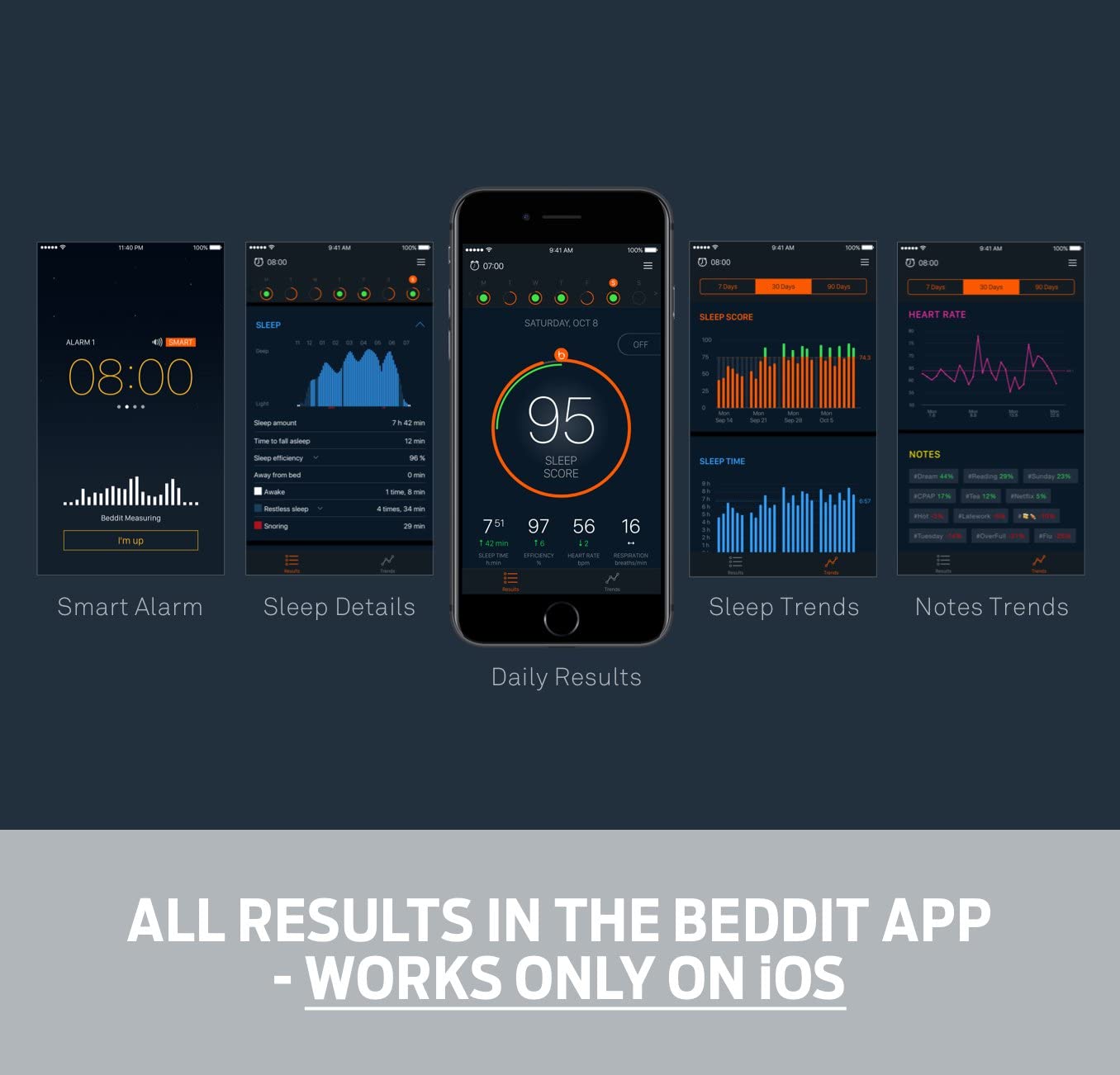

Not so Smart Alarm?Īlarms waking us while we’re in a deep sleep can ruin our mornings.
Beddit sleep monitor android#
(Note, there are limitations in the Android platform behind this, so this might take some time still). Where is Beddit lets down? Android Users Behind the Curve in FeatureĪutomatic sleep tracking has been on the iPhone for over a year now but still no word on this being rolled out to Android. These feature rollouts will no doubt continue.
Beddit sleep monitor upgrade#
The Beddit 3.0 hardware upgrade has just come out with temperature & humidity monitoring.

The Beddit team are regularly updating the app with new features - over the last six months are tagging and trends. AccuracyĪt 99% accuracy, I’m much more confident in the sleep graphs the Beddit gives than any wrist tracking devices. Scrolling down and its easy to the heart rate & sleep depth graphs. The Good The UIįirst thing in the morning while turning off my alarm I need a device that’s easy to use. It even gives more advanced metrics like overnight Heart Rate Variability (HRV).īeddit also has an API to access data, but currently only available for companies or research teams.
Beddit sleep monitor download#
Accessing the Raw Dataīeddit has a feature to download raw data to a spreadsheet, which can be very useful for doing any detailed analysis. Note, the Beddit is used in many clinical studies around the world. Beddit comes in pretty good at 99% - much better than any wrist sleep tracking device (see here for more details). Many studies have been done using the Beddit & comparing it with the gold standard in sleep tracking, Polysomnography. The sensor in the Beddit ( ballistocardiography) is the best type of sleep sensor available short of measuring brain waves through an EEG device (like the Zeo). For someone suffering from a sleep disorder like sleep apnea, this could be a life changer.
I can even get dedicated sleep coaches to look into two-week reports. Beddit brings sleep coachingīeddit connects with my Physicians Electronic Health Record (EHR) network so that I can get my sleep data to my doctor. Seeing my weekly sleep stats every time I set the alarm is a shows me clearly when I’m running sleep debt over many days. Note - from December 2016 this is only available on iOS. Maybe from the change of sleep schedule from the weekend? Quality here means overnight movement, wake time and snoring among other factors.įor me, eating late at night and alcohol are the biggest. The sleep score takes into account quality & quantity. Beddit FunctionalityĪt the core of the Beddit UI is the ‘sleep score’. Staying up late surfing social media, eating late or if the room was too hot. For me, bad sleep was nearly always related to lifestyle. A better understanding of how I slept is the first step.Ī good sleep sensor should be easy to use and give us enough information to show how we slept.Ī good sleep sensor should also be able to trigger insights on how I can improve my sleep. While my sleep hasn’t been bad, there’s always room for improvement. The Beddit, a dedicated, contactless sleep sensor just brings a whole new level of insights to my sleep. If we have a wearable fitness device that already that tracks sleep, why do we need a dedicated sleep tracker?Ī year ago I had to think long & hard to get a dedicated sleep tracker when I already had a wearable that tracked sleep. The positive likelihood ratio (LR+) for AHI ≥5 was 7.18 (95% CI: 3.69, 14.0), and the negative likelihood ratio (LR-) for AHI ≥5 was 0.16 (95% CI: 0.072, 0.368).Note - It looks like the Beddit device is no longer being sold. Thirty-five participants (34.3%) were diagnosed with obstructive sleep apnea (OSA) with an apnea-hypopnea index (AHI) ≥ 5 based on PSG. The epoch-by-epoch accuracy of Sleeptracker-AI Monitor to distinguish 4-stage sleep (wake, light, deep, and REM sleep) was 79.0% (95% CI: 77.8%, 80.2%) with a Cohen's kappa of 0.676 (95% CI: 0.656, 0.697). Sleep efficiency (SE) was similar between the Sleeptracker-AI Monitor and PSG (87.6% and 86.3%, respectively). The Sleeptracker-AI Monitor overestimated total sleep time (TST) by an average of 6.3 min and underestimated wake after sleep onset (WASO) by 10.2 min. Overall, the Sleeptracker-AI Monitor estimated similar sleep continuity measures compared with PSG.


 0 kommentar(er)
0 kommentar(er)
